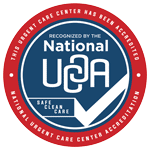School-age children get sick. It’s simply a fact of life. Some 200 kinds of cold virus lurk on everyday objects, and when a kid comes down with an illness, it’s only a matter of time until more catch it—a lot more. Fortunately, you don’t have to take a cold lying down. Here are some helpful points on how to treat kids’ colds, flu, sinus infections, and other things they bring home from school.
Get plenty of naps and lots of nourishment. The best way to battle the common cold with one’s own innate defenses. That fatigue your child feels is his or her body’s way of signaling the need for more rest, and a rested kid stands a better chance of besting a virus within a shorter period of time. Similarly, a well-rounded diet revs up the immune system, giving it the upper hand over a nasty infection.
Skimp on sugar. Most of us are already aware that Americans get an awful lot of sugar in our everyday diets, but did you know that sweet stuff can keep you sick longer? The University of Wisconsin-Madison hospital system has stated that as little as 100 grams of sugar will slow white blood cell activity, hampering immune activity. The real kicker, though? Most of us get 200 grams or more daily.
Keep the liquids flowing. Hydration matters, particularly when dealing with a fever. Ensuring that your child drinks enough should help loosen mucus and replace liquids lost to sweating.
Pop zinc lozenges. Though the plethora of common-cold viruses out there makes it difficult to treat their symptoms with prescription medications, one simple element can make a big difference: zinc. A study by The Open Respiratory Medicine Journal showed that zinc tablets or lozenges can reduce colds’ durations by up to 40 percent.
Stay away from most medicines. Drugstore shelves fairly brim with over-the-counter remedies that promise to make cold symptoms evaporate. The problem, though, is that studies show few of them actually work and many of them can negatively impact little bodies. Stick to more natural remedies until your children are at least 16 years old.
Of course, you can’t handle every illness at home. Some require prompt medical attention. If your child doesn’t start to recover after a few days, experiences extreme fatigue, has a high fever, or suffers from asthma, diabetes, or some similar health concern, see your family doctor or visit us here at M.D. Express Urgent Care. Our 5 convenient locations are open 7 days a week to serve your families healthcare needs. At M.D. Express Urgent Care, the doctor is always in!

